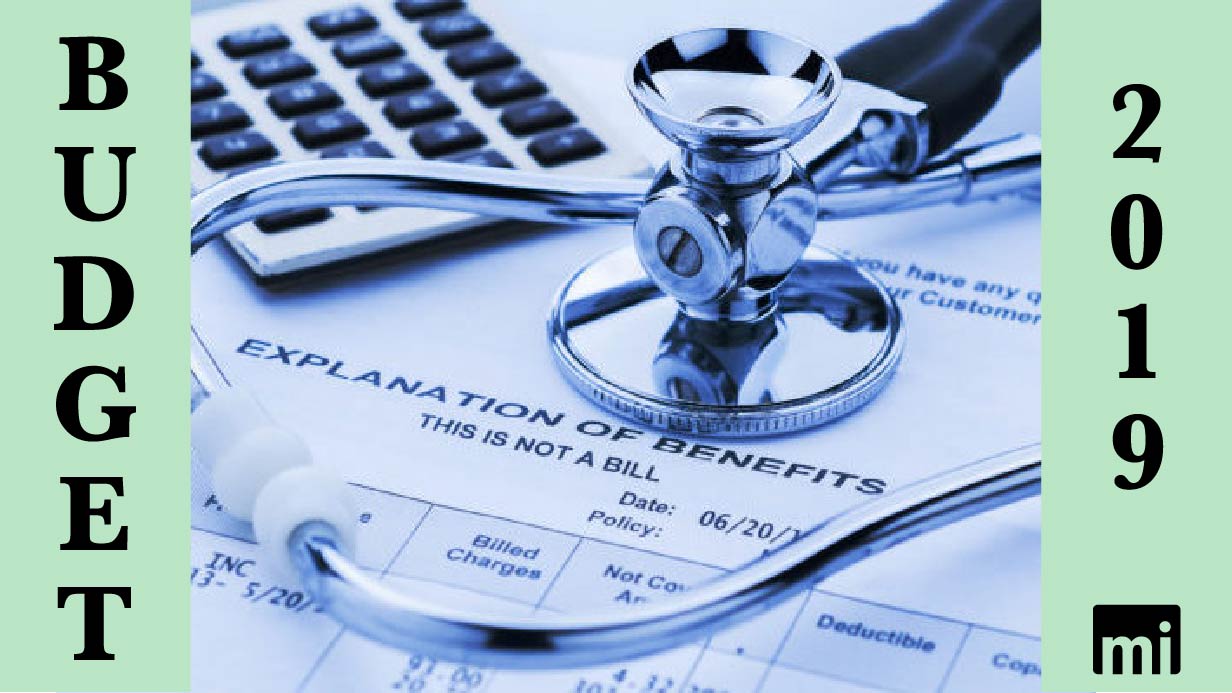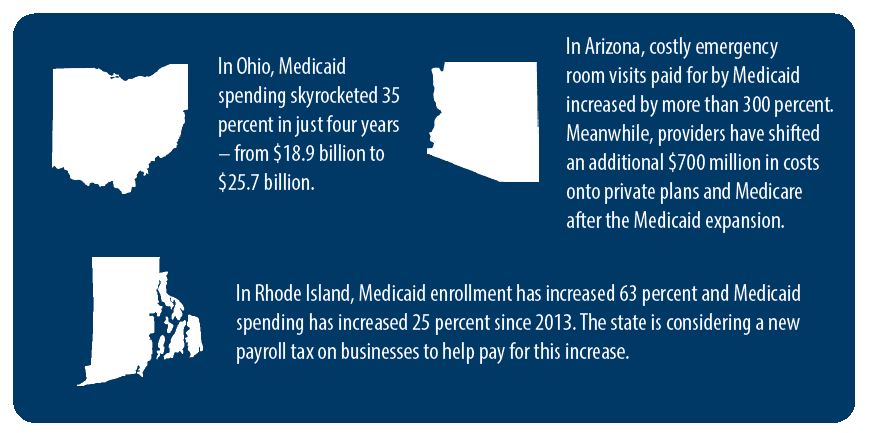 The Republican-controlled JFC on Tuesday voted 11-4 along party lines to boost overall Health Services spending by a whopping $1.63 billion (all funds) over the next two years, without expanding Medicaid. #wiright #wipolitics Click To Tweet
The Republican-controlled JFC on Tuesday voted 11-4 along party lines to boost overall Health Services spending by a whopping $1.63 billion (all funds) over the next two years, without expanding Medicaid. #wiright #wipolitics Click To Tweet
MacIver News Service | June 5, 2019
By M.D. Kittle
MADISON, Wis. — Republicans on the Legislature’s budget-writing committee upped the ante Tuesday on health and welfare spending, proposing huge increases in a litany of government programs and initiatives.
It wasn’t nearly enough for Joint Finance Committee Democrats, who have their hearts set on making Wisconsin join the ranks of states that have taken the promised “free money” in the federal Medicaid expansion.
The GOP motion for health care rejects Medicaid expansion, but spends $588 million more in GPR than prior spending. The majority of the massive price tag is Medicaid’s cost-to-continue.
In the end, the Republican-controlled JFC voted 11-4 along party lines to boost overall Department of Health Services (DHS) spending by a whopping $1.63 billion (all funds) over the next two years, and to increase the Department of Children and Families biennial budget by north of $125 million.
As Republicans pointed out, their budget surpasses, in some cases doubling, Democrat Gov. Tony Evers’ budget proposal.
The GOP spending increases, including $588 million in state General Purpose Revenue (GPR) for the Department of Health Services, will certainly have some fiscal hawks thinking Finance Committee Republicans are trying to out-Evers Evers, whose biennial budget plan tips the scales at $84.2 billion – an 8 percent increase from the current two-year spending plan signed by former Gov. Scott Walker.
A look at state spending on Medicaid since 2011. Tonight’s GOP motion will spend another $588.2 million more than FY 18 pic.twitter.com/7vKpWMhLQN
— MacIver Institute (@MacIverWisc) June 5, 2019
JFC Republicans expanded funding for Wisconsin’s troubled nursing homes, substantially raised wages for personal care workers and added $60 million for hospitals that treat higher populations of poor patients, all without being bribed into expanding Medicaid — what many conservatives consider to be a Faustian deal.
“We have said all along expanding Medicaid wasn’t necessary based on where we were,” said Rep. John Nygren (R-Marinette), JFC co-chair. More than 1.1 million, or about 1 in 5, Wisconsinites are on Medicaid or related programs today. And while unemployment is at record lows, Medical Assistance (MA) rolls have increased significantly over the years. In 2019, just 2.6 workers support every one MA recipient. In 1998, Wisconsin had 7.2 workers for every MA recipient.
A look at MA funding and enrollment over time. Spending has outpaced inflation by almost four times since 2004 #wipolitics #wibudget pic.twitter.com/yJGSmn9cVI
— MacIver Institute (@MacIverWisc) June 5, 2019
And Wisconsin is currently in tremendous economic shape. Recent projections show state tax collections over the next three years will come in $753 million higher than previously anticipated, although much of that better-than-expected revenue is thanks to changes in the federal tax code. As MacIver News Service first reported, Wisconsin has been rated among the “stronger” states in recession preparedness, according to leading credit rating firm Moody’s Investor Services.
Nygren said Republicans are using the benefits of conservative tax and regulatory reforms over the past eight years to fund budget priorities. At the same time the GOP budget retains welfare reforms such as drug testing for FSET (FoodShare Employment and Training) and mandatory FSET participation for able-bodied adults.
“We’re not expanding welfare,” Nygren said.
“I think what we’re doing is investing in people, not programs,” said Sen. Alberta Darling, committee co-chair.
Committee Democrats fumed about what they assert is Republicans’ foolish refusal to expand Medicaid — and take the hundreds of millions of dollars in federal money that come with it.
Evers’ budget plan is built on Medicaid expansion, on the $320 million or so in Medicaid payment savings and the $1.6 billion in additional federal funds the Evers administration says expansion would bring into the state’s coffers.
As MA rolls grow, despite record-low unemployment, Wisconsin also has a demographic problem: the population aged 65 or older is projected to double in the next 30 years. @GovEvers budget and the Dem motion tonight would add many more to MA #wibudget #wiright pic.twitter.com/AV8t71PIbJ
— MacIver Institute (@MacIverWisc) June 5, 2019
“The Medicaid expansion is intimately tied to the Democrat’s proposal and how it plays with federal funding,” said state Rep. Evan Goyke. The Milwaukee Democrat complained that Republicans, again, were “screwing over” his city.
Committee Democrats ratcheted up the rhetoric, accusing Republicans of moral turpitude.
“It’s a choice you are making. There is no moral high ground in your choice, on turning your back on the people’s lives you could save,” said Rep. Chris Taylor (D-Madison).
The governor insists that taking the federal Medicaid money would open up public health care to some 82,000 Wisconsinites. But Republicans point out that about half already have coverage through health insurance exchanges set up under former President Barack Obama’s cornerstone health care law. Some of the highly subsidized plans cost as little as pennies a month.
The 82,000 or so Wisconsinites @govevers says would benefit from Medicaid expansion have options on exchanges today. “For pennies on the dollar,” as @rep89 just said. Unlike other states WI does not have a coverage gap https://t.co/CjAZpj9qlo
— MacIver Institute (@MacIverWisc) June 5, 2019
“That’s the lie of the year that has been presented before us,” Nygren said of the Evers administration’s 82,000 coverage figures.
Lost in the Medicaid expansionist rhetoric is the fact that Wisconsin has little to no coverage gap, unlike many other states.
Finance Committee Democrats attempted to bring back the Evers’ Medicaid expansion plan, which was among 130 “nonfiscal” items that JFC had previously pulled out of the budget document. Dems knew the rules. They either had to remove the expansion provision from their Health Services budget proposal or risk having the full budget motion ruled “out of order.”
Nygren gave Taylor and her fellow Democrats three opportunities to remove the controversial budget item. Taylor would have none of it.
“We are not out of order, we believe you and your colleagues are out of order,” the Madison Democrat said. The DHS budget proposal went down without debate.
Despite the Democrats’ frustration over Republican intransigence on the Medicaid issue, the budget passed by the majority gives Evers and liberals in general much of what they wanted — in some cases more. The spending plan:
- Increases funding for nursing homes by $30 million General Purpose Revenue over the biennium, a combined 7.4 percent increase in nursing home reimbursement rates. That’s lower than the $83 million advocates had sought, but significantly higher than the 2.5 percent increase Evers’ budget offered.
- Increases funding for personal care workers by $37 million GPR over the biennium. That means an hourly wage hike from $16.73 to $18.24 for an industry struggling to find and retain caregivers, Republicans said.
- Adds $23.5 million more in GPR for Children and Family Aids funding.
- Provides nearly $10 million in additional GPR funding for Rural Critical Care Supplement program.
- Offers a significant uptick in childcare funding commitments.
The Republican budget includes $917.4 million in MA Cost-to-Continue funding, about $356 million of that in GPR funds. Medicaid makes up the vast majority of the MA program.
Tuesday’s Finance Committee vote could spell doom for a timely state budget. Evers has threatened to veto any budget that does not include the Medicaid expansion. The governor earlier this year said he would “fight like hell” for it.
The committee will again meet on Thursday at 1pm to debate transportation funding.
